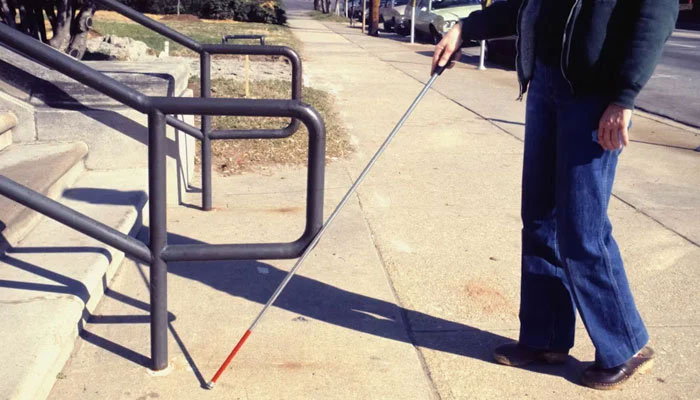Blind people excluded from benefits of AI, says charity
PARIS: Blind and partially sighted people are being excluded from the benefits of artificial intelligence tools and facing “a new level of discrimination”, the new president of the Royal Society for Blind Children has claimed as he called for better design of everything from video games to AI agents.
Tom Pey said existing difficulties for blind children were “now compounded because they’re excluded (and) distanced from their non-disabled peers, because those people can experience games, alternative realities and the AI-driven visual types of technology”.
Pey lost his sight as a child and created the Waymap app which offers step-by-step audio navigation instructions.
His comments come as tech firms launch more visually based AI-powered systems such as Meta’s range of spectacles and the Google Lens function, which relies on users pointing their phone camera at objects or places.
Pey called on the technology secretary, Peter Kyle, to “formulate laws that will support the needs of disabled people, but also help direct the big companies and startups, so they include disabled people”.
“If we look at the hardware around AI, a lot of it is visual, and it ignores the needs of blind people, and it ignores people who have difficulty, not just with not being able to see, but being able to interpret visual imagery,” he said. “Those people, like me and others, we’re just excluded.”
People with sight loss are less likely to use the internet every day, more likely to be digitally excluded and less likely to own a smartphone compared with the rest of the population, research by the Royal National Institute of Blind People recently found. But it also reported that digital exclusion for blind and partially sighted people was reducing and that AI technology was becoming more accessible.
In response, tech companies including Google, Meta and Open AI all pointed to initiatives to use their tech to help blind and partially sighted people.
-
 Andrew Mountbatten Windsor Faces Future With UK MPs, Says Expert
Andrew Mountbatten Windsor Faces Future With UK MPs, Says Expert -
 Shamed Andrew Told 'nobody Is Above The Law' Amid Harrowing Silence
Shamed Andrew Told 'nobody Is Above The Law' Amid Harrowing Silence -
 Gisele Bundchen Melts Hearts With Sweet Bike Ride Glimpse Featuring Son
Gisele Bundchen Melts Hearts With Sweet Bike Ride Glimpse Featuring Son -
 Prince William Found Meghan Markle ‘quite Refreshing’ At Start
Prince William Found Meghan Markle ‘quite Refreshing’ At Start -
 Kate Middleton Knew Should Could Not Be ‘voice Of Reason’ With Prince Harry
Kate Middleton Knew Should Could Not Be ‘voice Of Reason’ With Prince Harry -
 Rihanna Has Wardrobe Malfunction At A$AP Rocky Fashion Show
Rihanna Has Wardrobe Malfunction At A$AP Rocky Fashion Show -
 Prince Harry Felt System Had ‘one Rule For Him, One For Prince William’
Prince Harry Felt System Had ‘one Rule For Him, One For Prince William’ -
 Jake Paul's Fiancée Sends Him Over The Moon Over Stunning Victory
Jake Paul's Fiancée Sends Him Over The Moon Over Stunning Victory -
 Harper Beckham Sends Valentine’s Love Amid Brooklyn Family Drama
Harper Beckham Sends Valentine’s Love Amid Brooklyn Family Drama -
 Why Prince William, Kate Middleton 'partnership' Is Important For Monarchy
Why Prince William, Kate Middleton 'partnership' Is Important For Monarchy -
 Katie Price Drama Escalates As Family Stays In Touch With Ex JJ Slater
Katie Price Drama Escalates As Family Stays In Touch With Ex JJ Slater -
 Critics Target Palace Narrative After Andrew's Controversy Refuses To Die
Critics Target Palace Narrative After Andrew's Controversy Refuses To Die -
 Sarah Ferguson’s Delusions Take A Turn For The Worse: ‘She’s Been Deserted’
Sarah Ferguson’s Delusions Take A Turn For The Worse: ‘She’s Been Deserted’ -
 ICE Agents 'fake Car Trouble' To Arrest Minnesota Man, Family Says
ICE Agents 'fake Car Trouble' To Arrest Minnesota Man, Family Says -
 Camila Mendes Reveals How She Prepared For Her Role In 'Idiotka'
Camila Mendes Reveals How She Prepared For Her Role In 'Idiotka' -
 China Confirms Visa-free Travel For UK, Canada Nationals
China Confirms Visa-free Travel For UK, Canada Nationals




